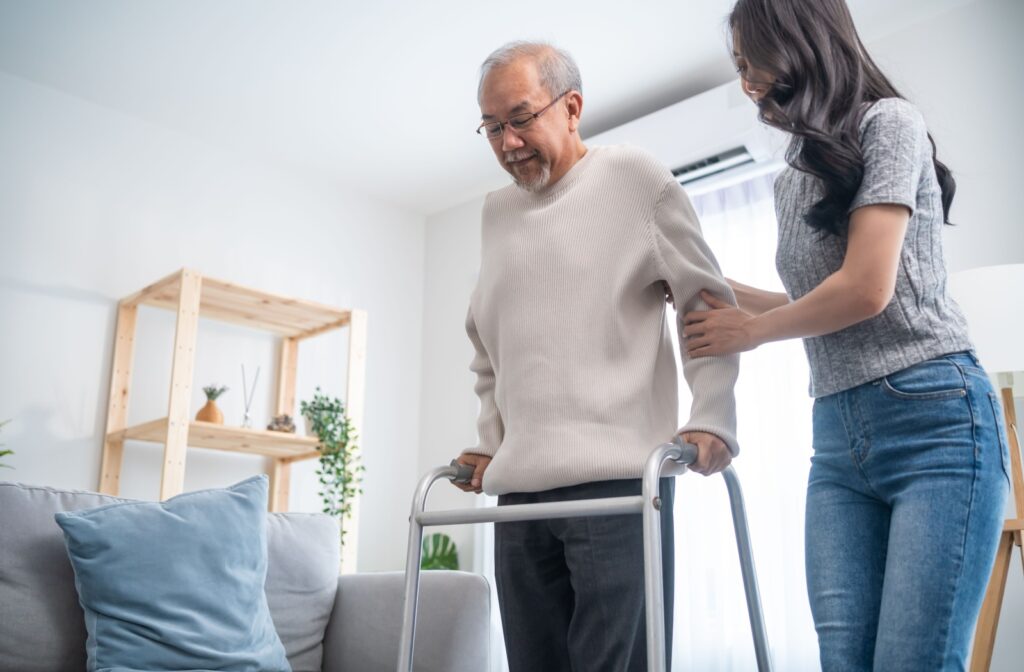Caring for an elderly parent is a role that comes with its unique set of challenges and rewards. When mobility becomes an issue and walking is no longer possible for your loved one, care dynamics can change significantly.
Caring for an elderly parent who can’t walk requires adjustments, both physical and emotional, for the caregiver and the care recipient. You can care for a parent by modifying the home, using assistive devices, seeking support from family, and considering services that offer personalized care based on their needs.
Physical & Emotional Needs of an Elderly Parent
The first step in effectively caring for an elderly parent is understanding the comprehensive nature of their needs, which are often more than just physical. Physically, immobility requires considerations such as preventing pressure sores, providing proper nutrition, and managing pain or discomfort.
The loss of mobility can also significantly impact one’s mental health, potentially leading to feelings of dependence, frustration, and isolation. Acknowledging these physical and emotional challenges is crucial. Mentally, staying engaged, connected, and active as much as possible can help ward off depression and cognitive decline.
Home Modifications for Safety & Comfort
Transforming your home so an elderly parent feels safe and comfortable is paramount. Home modifications and safety measures can include:
- Installing grab bars or handrails in key areas such as the bathroom.
- Rearranging furniture to allow for easy wheelchair access.
- Consider investing in a pressure-relief mattress.
- Keep hallways and rooms well-lit.
- Keep areas free from clutter and remove tripping hazards.
- Have an emergency response system in place in case of any accidents or emergencies.
These modifications can not only improve safety but also promote independence and autonomy for your loved one. It’s crucial to continually assess and adapt the home environment to meet the changing needs of an elderly parent.
Assistive Devices
Assistive devices and mobility aids are essential for both the caregiver and the care recipient. These devices not only help improve the quality of life for an elderly parent who can’t walk but also make caregiving tasks more manageable.
From wheelchairs, wheelchair ramps, and walkers to hospital beds and transfer devices, a wide range of assistive equipment is available to aid in movement, comfort, and safety. It’s crucial to assess your loved one’s specific needs and seek professional advice when selecting and using these devices. With proper use, these aids can improve mobility, reduce strain on the caregiver, and enhance independence for an elderly parent.
Lean on Support Resources
Remember, you’re not alone in the caregiving journey. Various resources can provide support, guidance, and sometimes even financial assistance. You can seek help from family members, home health aides, meal delivery, and transportation assistance for an elderly parent.
Connecting with others in similar situations through online forums and support groups can provide emotional support, practical advice, and a sense of community.
The Importance of Self-Care for Caregivers
Caring for someone who can’t walk is demanding, both physically and emotionally. Often, caregivers put their own needs last, resulting in caregiver burnout. However, it’s essential to prioritize your well-being to maintain the stamina required for caregiving. In some cases, enlisting the help of a professional caregiver, even for a few hours a week, can make a significant difference.
Regular breaks, proper sleep, healthy eating, and finding time for activities you enjoy are all critical for preventing caregiver burnout. Respite care in senior living communities provides short-term care with comprehensive support, services, and amenities in a safe and comfortable environment.
Assisted Living with Personalized Care
Assisted living communities offer a supportive and safe environment for elderly individuals who require assistance with daily activities, such as bathing, dressing, and medication management. For an elderly parent who can’t walk, this can be a beneficial option as it allows them to maintain independence while receiving the necessary care and support.
Assisted living provides specialized services tailored to the individual’s needs, promoting physical and emotional well-being. By helping with caregiving tasks, assisted living can also alleviate some stress on family caregivers. Ultimately, it balances independence and support while preserving their dignity and autonomy.
Care & Support for an Elderly Parent
Caring for an elderly parent who can’t walk is no small feat and often requires several changes, including patience, love, compassion, and resilience. Caring for an elderly parent also provides them with the comfort of home and family, the assurance of safety, and, most importantly, your presence.
Caregiving can be rewarding and physically taxing, but you don’t have to do it alone. Seeking help, taking breaks, and caring for your health are not signs of weakness but of strength.
Book a tour with The Legacy at South Plains to learn about assisted living and how we can provide the care and support an elderly parent needs.


